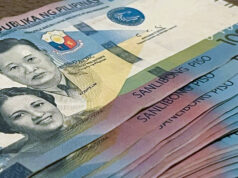Inflation rising but policy steady — poll
By Melissa Luz T. Lopez
Senior Reporter
PRICES of basic goods and services likely rose faster in September, led by higher food, oil, and utility costs, according to analysts in a BusinessWorld poll who nevertheless said this is unlikely to prompt rate adjustments by the central bank anytime soon.
Thirteen economists were asked in a BusinessWorld poll late last week that yielded a median estimate of 3.2%, which if realized will be higher than August’s 3.1% and the 2.3% logged a year ago.

This also compares to the 2.8-3.6% estimate range given by the Bangko Sentral ng Pilipinas (BSP) last week.
The Philippine Statistics Authority will release official inflation data for September on Thursday.
“The continued rise in global oil prices kept the upside pressure on transport prices. Meanwhile, electricity prices rose on the back of higher generation costs,” ANZ Research economist Eugenia Fabon Victorino said in an e-mail.
Ildemarc C. Bautista, vice-president and head of research at Metropolitan Bank & Trust Co., said that higher prices of fuel, meat and vegetables contributed to monthly inflation, but were offset by a slower pickup in the cost of rice, fruits and fish.
Analysts likewise noted that the peso’s depreciation against the dollar may have added some pressure on overall price movements, but some noted that the pass-through on overall costs remains muted.
The peso initially traded weaker than P51 to the greenback, but returned to the P50 level later that month.
Analysts expect inflation to settle within the central bank’s 2-4% target band, leaving no cause of alarm that would warrant an adjustment in the benchmark borrowing rates.
“I think there is still room for the BSP to keep its key interest rates unchanged over the remaining months of 2017. This is because I don’t think inflation will spike close to or breach the upper limit of the BSP’s inflation target range within the year,” Security Bank Corp. economist Angelo B. Taningco added.
However, some economists still think that a rate hike may be on the table this year.
“Inflation is currently well within the BSP’s inflation target for the year, although its increasing trend might prompt a single rate hike before 2017 ends,” said Guian Angelo S. Dumalagan, market economist at Land Bank of the Philippines.
“The BSP might initiate preemptive tightening moves given that monetary policy works with a time lag. Moreover, expectations of another US interest rate hike this year might also warrant a similar move from the BSP as a way to maintain stability in the financial markets.”
Mitzie Irene P. Conchada, economics professor at the De La Salle University, added that the BSP may consider a 25-basis-point ratehike if monthly inflation will keep rising and if the peso weakens further in the months ahead.
The central bank expects full-year inflation to settle at 3.2%. BSP Deputy Governor Diwa C. Guinigundo said price increases are unlikely to breach four percent in the months ahead and would likely stay close to the 3.4% peak clocked in March and April, despite a higher-than-expected increase in Metro Manila’s daily minimum wage that takes effect on Oct. 5.
The BSP kept interest rates steady in its Sept. 22 review in the face of manageable inflation and robust domestic economic activity.



